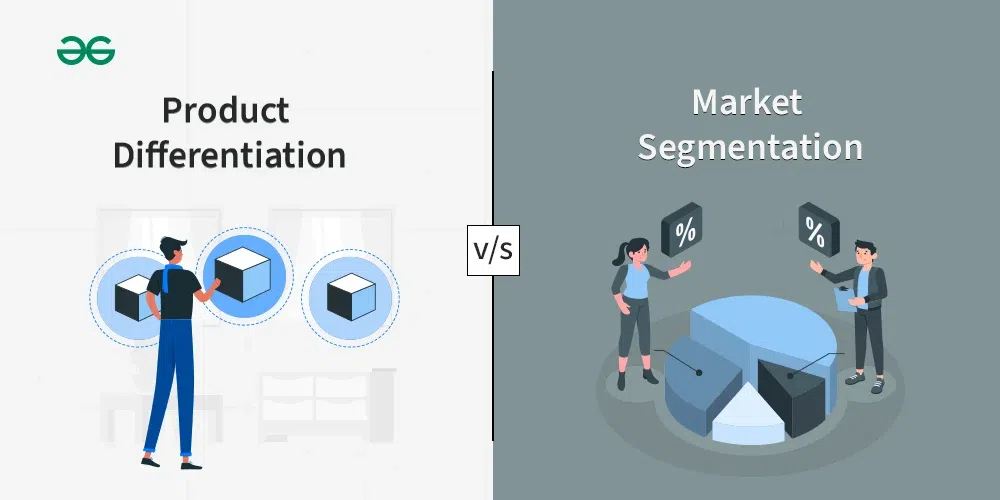Difference between Product Differentiation and Market Segmentation
Last Updated :
08 Feb, 2024
In the realm of product management, the strategic decisions around product differentiation and market segmentation play a paramount role in shaping the success and sustainability of a product. Product managers are tasked with not only developing and refining the features of a product but also with understanding the diverse needs of the market it serves. This dynamic requires a nuanced approach that incorporates both product differentiation and market segmentation to create a product that not only stands out but also resonates with specific consumer segments.

Product Differentiation and Market Segmentation
.webp)
What is Product Differentiation?
Product differentiation is a marketing tactic in Product Management used by businesses to set their goods and services apart from those of their rivals. The goal is to make the company’s products or services unique and more appealing to the target market. By highlighting the distinctive features, benefits, or qualities of their offerings, companies can create a competitive advantage and attract customers.
What is Market Segementation?
Market segmentation is a marketing strategy that involves dividing a broad target market into smaller, more manageable segments based on certain criteria. The purpose of segmentation is to identify and understand specific groups of customers with similar characteristics, needs, and behaviors. By doing so, businesses can tailor their marketing efforts to better meet the unique requirements of each segment, resulting in more effective and targeted campaigns.
Product differentiation Vs Market Segmentation
Here is the following difference between Product differentiation and Market Segmentation:
| Aspect |
Product Differentiation |
Market Segmentation |
| Definition |
Making a product unique by emphasizing its distinctive features and benefits. |
Dividing the market into smaller groups based on characteristics to tailor marketing strategies. |
| Focus |
Emphasizes the product itself and how it stands out from competitors. |
Focuses on understanding and catering to the diverse needs of specific customer groups. |
| Goal |
To create a perceived value and uniqueness for the product in the eyes of the consumers. |
To customize marketing efforts for different segments, maximizing relevance and appeal. |
| Strategy |
Stresses on product features, branding, and positioning in the market. |
Involves identifying and targeting specific customer groups with tailored messages and offerings. |
| Scope |
Concerned with the attributes and characteristics of the product. |
Concerned with the characteristics and behaviors of the target audience. |
| Example |
Introducing a new feature, design, or functionality to make the product stand out. |
Creating different advertising campaigns for different age groups or geographic locations. |
| Application |
Primarily associated with the product development and branding phase. |
Applied during marketing and promotional activities. |
| Outcome |
Aims to create a competitive advantage and increase customer loyalty. |
Aims to enhance customer satisfaction and engagement by meeting specific needs. |
Conclusion: Product differentiation Vs Market Segmentation
In the busy and always changing world of managing products, figuring out how to make your product stand out and knowing who wants to buy it are both really important. Product managers have to be good at both making their product different and understanding the different kinds of customers out there. By doing both well, they can make customers happy and keep them coming back for more. As things keep changing, product managers who can do this balancing act will be in a good position to succeed. The key is not just making a great product but also making sure it’s what the right people want by being clever with how the product is different and who it’s meant for.
FAQs On Product differentiation Vs Market Segmentation
1. What is product differentiation?
Product differentiation is a marketing tactic in Product Management used by businesses to set their goods and services apart from those of their rivals. The goal is to make the company’s products or services unique and more appealing to the target market.
2. What are the main types of product differentiation?
There are primarily three types of product differentiation: mixed, vertical, and horizontal. Every one has benefits and drawbacks, and in the end, a customer’s assessment of a product is specific to them.
3. What is the purpose of market segmentation is to differentiate products?
Businesses can differentiate their products to meet the needs of specific market segments by having a thorough grasp of these segments. In order to discover and establish competitive advantages with their target consumers, they can also employ segmentation analysis.
4. What is meant by market segmentation?
Market segmentation is a marketing strategy that involves dividing a broad target market into smaller, more manageable segments based on certain criteria. The purpose of segmentation is to identify and understand specific groups of customers with similar characteristics, needs, and behaviors.
Share your thoughts in the comments
Please Login to comment...